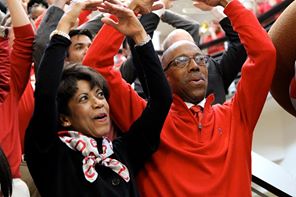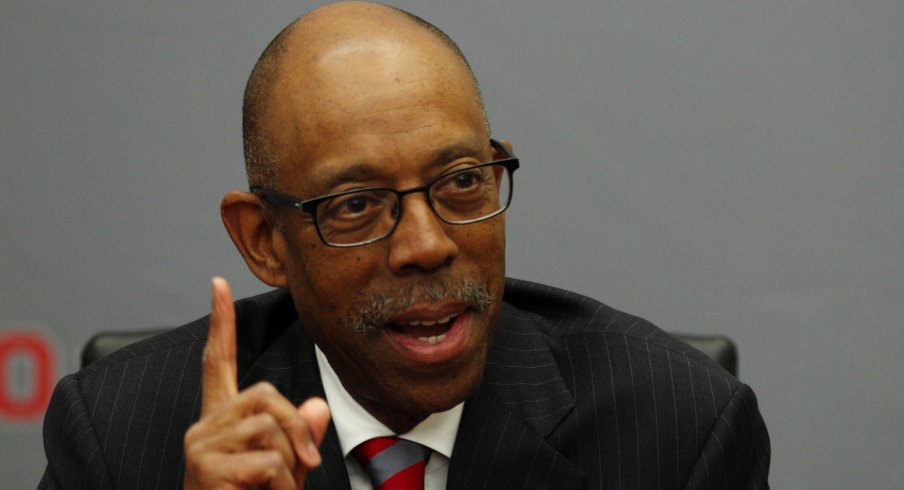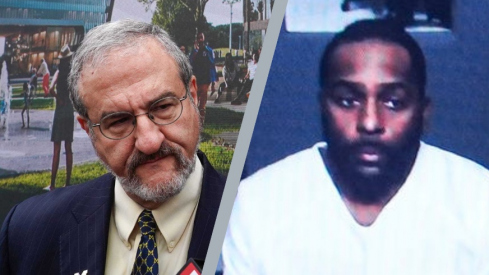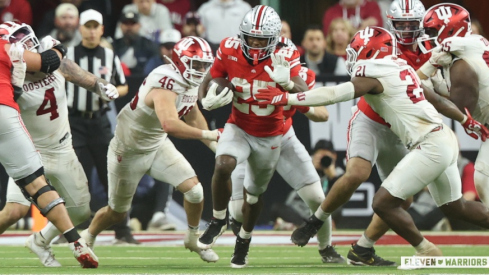On January 30, Ohio State named Michael Drake as the university’s next president, succeeding beloved figure, E. Gordon Gee. Drake, a superstar in academia and the medical world, was a relative unknown to students and alumni. But he quickly made his presence felt with an impressive speech following the Board of Trustees’ confirmation.
Drake is currently finishing his duties as the chancellor at the University of California at Irvine. He’s due in Columbus this summer, where he’ll discover, among other things, the $1.1 billion overhaul of the Wexner Medical Center, the largest expansion project in the university’s history. Drake will also stumble upon a colossal athletic department that’s familiar in all corners of the globe.
He spoke to Eleven Warriors in an exclusive interview Wednesday afternoon, covering a wide array of topics – the NCAA, life lessons, cycling and coaching salaries.
11W: You’re on the NCAA Board of Directors, you’re one of the leading voices for change on a very influential governing body. How has your experience been?
Michael Drake: “It’s been very good working with a group of colleagues who represent a variety of different institutions and conferences all trying to do the same thing – and that is to continue to help the organization move forward in its quest to uphold what’s so grand about college athletics.”
11W: This is a very transformative time in college athletes. Major changes have taken place the past few years or are set to take place in the near future. Subjects at the forefront are the power conferences possibly breaking away, players being paid and unionization. Do you foresee a time where those happen?
MD: “I guess there’s nothing constant except change. Change of various types is always in the air. I think the goal that we have on the board at the NCAA is to maintain those things that have been the backbone of college athletics for more than a century and try to continue to protect those values as we roll forward. We’re all working together, all trying to do what we can to make sure that we create a platform in which people can participate in and enjoy intercollegiate athletics for what they’ve been.”
11W: With the evolution of college sports, in just the last 10, 20 years there have been major shifts. Do you think that’s going to continue? Could we get to a point, let’s say 15 years down the road, where it’s somewhat unrecognizable to what we know today?
MD: “Well, I hope not. I think there have been things that have been sustaining and very valuable about the collegiate athletic experience, where young men and women from all walks of life get to participate in a variety of sports. Most of our attention is focused on one’s that tend to be very popular crowd pleasers. But most athletes are participating in sports that very few people watch. They’re there for the purity of the sport. I think that’s something that’s a valuable part of the collegiate experience broadly, and we’d like to maintain that as much as possible.”
11W: Ohio State’s athletic department is one of the biggest in all facets – sports it offers, budget, national reach, brand, etc. What is your philosophy on what college athletics’ role is on campus and its overall role in the college experience?
MD: “[At UC-Irvine] we speak of academic excellence, research excellence, character excellence and leadership excellence. One of the things our athletic programs do is gives students, coaches and the community a chance to really work on character and leadership excellence. I think that’s a very important part of what college athletics brings to the participants. And a sense of community and a sense of being part of a broader community is a wonderful offshoot of the athletic experience.
“We want to have outstanding programs because we want to be outstanding in all that we do.”– Michael Drake
“So our fans coming out to the games is something that’s very, very important to developing and maintaining that sense of community. It also helps us stay connected with our alumni and others who had a great experience with us on campus and are now all over the world and get to root for us. College athletics is a part of the glue that makes the collegiate experience such a special time in life.”
11W: In Ohio State’s case, the football team is the most visible thing for the university. It gets so much national attention. At UC Irvine, you’ve won some national championships [in men’s volleyball] the last few years. Anytime athletic programs do well, it helps the university as a whole. When Butler and Wichita State went to the Final Four, applications were up.
How important is it for Ohio State to have an athletic team that’s so visible and has a national brand, like being the front porch of the university?
MD: “It’s one entry point and one point of connectivity with the broader public, but there are many others as well that are really important. I really think of it as something we support for its own virtue, and that is the quality of the program, the experiences that the young men and women who are part of our athletic programs have with their teammates and coaches, the life lessons that they learn. Those things are the most important parts for me. The way they represent the university is a very, very important part of our broader public face.
“But I tend to think from the inside out more. That is the value that the programs provide to the participants and to the community who come out to support them are things that I think about the most. We want to have outstanding programs because we want to be outstanding in all that we do. If that’s our motivator, we can have a great program if there are 100,000 people in the stands or if there are 100 people in the stands. It’s great to have 100,000 people there, but the most important thing for me is to have an outstanding program.”
11W: I wonder what your relationship is with Gene Smith. You’re two of the most prominent people in athletic roles. I know you hadn’t talked much before. Has that changed the last couple weeks?
MD: “We’ve had a chance to speak on a couple of occasions briefly. Actually, before this position came about for me, we had a chance to talk at the NCAA Convention, and then we said hello briefly after the announcement. I’m not on campus now yet, so we haven’t really had a chance to sit down and talk. He has a great reputation, we have many friends in common and I’m looking forward to working with him.”
11W: Do you feel like you’ll have a big involvement in the football program and the athletic programs overall, or will you sit back and let other people handle that and you’ll handle university matters?
MD: “I see the athletic program as an integral part of the university, and the president has a responsibility for making sure all those things are working well. As I would with any major part of our university, my goal is to be involved at an appropriate level and to try and do what I can to add value to it and to help the program continue to thrive. Let me say that I believe very much in the importance of having outstanding people in leadership roles like we do in Gene.”

11W: You’re an avid cyclist...
MD: “Yeah, I wish I had more time to ride. But I’ve been riding off and on for my whole life.”
11W: What are some other sports you enjoy? And I know you’re a popular sight at athletic events as well.
MD: “We enjoy supporting our teams. We enjoy supporting the teams that have big crowds and we also go to women’s water polo, and my wife goes to women’s golf matches and track and field. We try to make it to those sports that are not as popular as basketball and volleyball are on our campus.
“We like to make sure we show our support for the athletes and families that devote so much time to this endeavor. We believe in supporting the athletic programs for all those reasons.
“I dabbled a lot in recreational sports. I played tennis and golf. I don’t so much these days, but we were skiers for years. We did all the things that were fun to do. As a younger person, I played baseball like, I think, everyone did. I always enjoyed sports. People in my family are athletic, so it was a part of our upbringing and our daily lives.”
11W: Do you feel like life lessons and things involved in athletics intertwine, whether it’s team work or going against adversity? Do you see a correlation?
MD: “I think sports that are compelling for fans to watch tend to be sports in which those life lessons are, in fact, exhibited on the field during the course of a match. That’s, I think, what makes a great sporting match such a compelling think to watch.
“And then I think that there are great life lessons that one can learn and practice – integrity, commitment, focus, preparation – all those things are important for the participants. I really think it’s the fact that sports can encapsulate those life lessons that makes them so compelling.”
11W: Three of the most recognizable people on Ohio State’s campus are the president, the athletic director and the starting quarterback. Now, all three of those are African-Americans. Does that give you a sense of pride to see the progressive state of athletics?
MD: “What I would say is I believe in inclusiveness broadly. One of the great things about this country is, we’re not perfect at it, but we do a pretty good job of making opportunities available to people who have the focus, talent and interest in contributing at higher and higher levels. It’s something I’ve watched progress throughout my life. We still have a ways to go, but I think the inclusiveness of the country and the ability of people to contribute at higher and higher levels no matter where they come from is good and something we need to continue to work on.”
11W: There’s a major rise in coaches salaries, especially at BCS-level schools, whether it’s assistant football coaches, head coaches, basketball assistants. Is that a troubling thing to see, especially with some of these assistant coaches salaries going beyond $1 million? Obviously there’s a lot of money involved in athletics. But does it kind of show priorities are, not necessarily in the wrong place, but getting out of whack?
MD: “That’s something that’s new to me, so it’s better for me to wait and get some hands-on experience with that before I have a comment. I certainly notice it, but it’s something I’d feel more comfortable commenting on after I have a little more direct experience. That will come as I transition.”
That transition will begin on June 30, when Drake officially becomes the 15th president of Ohio State University. He enters what he was referred to as “the premier post in higher education in the United States” with a glistening resume of past successes.
Two months to the day after Drake steps into his role as OSU’s chief executive, the Buckeyes open the 2014 football season. It’ll serve as an indoctrination of sorts into the wild world of Buckeye Nation.


